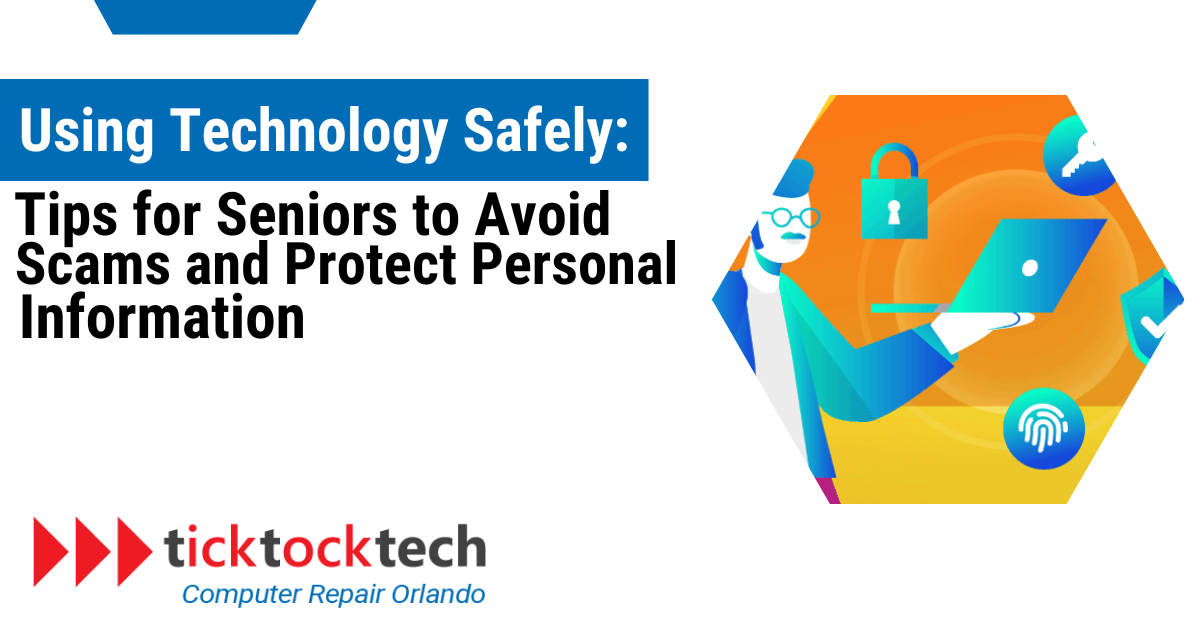Technology has a good and bad side. Although the good side supersedes the bad side, especially for IT gadgets. Also, information technology has uses and advantages for every age group. Humans sometimes contribute to the disadvantages of tech, especially when they use it dubiously. A senior uses a tablet, computer, or smartphone to pass the time off as they are retired, but instead, they are being targeted by dubious people online. But not to worry, there are tips for seniors to avoid online scams and protect their personal Information
These security and scam issues could be via hacking, coercing, or blackmailing. When these people get through the personal information of their victims, they get threatened. Retired seniors being vulnerable groups are an easy target are being focused on mostly. However, technology also offers solutions to its problem, as you can prevent this, or educate seniors on how to prevent this from happening.
By using technology safely, seniors get to avoid these scams and protect their personal information from them. Here are a few tips that work well in achieving that, walk with me.
1. Strong Password protection
To safeguard your online identity, strong passwords are essential. The following practical yet effective advice remains relevant. Fraudsters will search for methods to get on your hardware or software. Refrain from making ideas in public or outright. One technique they employ is contacting you to seek payment, after which you will get an email or SMS containing a one-time password (OTP).
They will then ask for this OTP and utilize it to access your devices or social media accounts. NEVER DISCLOSE OTP. Select simple passwords with a maximum of 64 characters and a minimum of eight mixed characters. Reset forgotten passwords right away. For significant websites, consider upgrading passwords once a year.
2. Use Two Factor Verification
In addition to a strong password, a 2-factor authorization is crucial. This ensures that, even if they bypass the first stage, your attention will be needed to bypass the second stage. The use of multifactor verification, also referred to as two-factor or two-step factor authentication, significantly enhances online security. This is an extra layer of security that trustworthy websites and apps use to keep your identity protected. This extra precautionary measure is used by businesses, banks, social media sites, enterprises, and educational institutions to boost security.

The multifactor strategy adds complexity in place of depending only on a password, which is susceptible to repetition, theft, and other security flaws. This second verification phase would be significantly more difficult for a hacker to imitate. By using this technique, data protection, servers, websites, and computer security are all improved.
3. Caution While using Social Media
Social media platforms offer connection and engagement, but they also pose risks, especially for seniors. Scammers often exploit the trusting nature of older individuals. Here are key precautions to take:
Privacy Settings Check
Ensure your social media accounts have strict privacy settings. Limit the visibility of personal information and posts to friends and family only. Avoid sharing sensitive details like addresses and phone numbers publicly.
Be Wary of Friend Requests
Scammers may create fake profiles to connect with seniors. Be cautious when receiving friend requests from unfamiliar individuals. Verify the person’s identity before accepting requests.
Avoid Oversharing
Resist the temptation to share personal information, such as financial details or travel plans, in public posts. Scammers often gather information for fraudulent activities from seemingly harmless posts.
Recognize Scam Messages
Be skeptical of messages claiming urgency, lottery winnings, or requests for financial assistance. Scammers often employ emotional manipulation to trick seniors into divulging personal information or sending money.
4. Watch out for Dubious Investment Schemes
There are fake investment schemes targeted at seniors looking to increase their earnings. Social media or chat platforms like Telegram are places where these unrealistic deals happen. They will make it look real you will see people give testimonies. Using a woman’s picture to give a sense of “reality” while they show you enough evidence to convince you. Do not join any group or channel without a reliable recommendation from someone you trust.

Anytime you come across them, especially if the deal is an unrealistic one, just get them blocked and delete any group they add you to. You can also ask on other social media like Reddit for the legitimacy of such an investment. There are also scammers lurking around the Facebook marketplace selling cheap products they don’t have. Beware of such a marketplace and shop things only around you or by trusted recommendations.
5. Dating Targeting Seniors are mostly scams
Online dating can be a fulfilling experience, but it’s essential to approach it with caution, as scammers frequently target seniors seeking companionship.
Check Identity
Make sure the individual is who they say they are before you start dating them online by using video chats or other means of identity verification. Fake profiles and pilfered images are common tools used by scammers to gain victims’ trust. Some are smart with video calls as they use recorded video, you can tell them to show you around, or better still call them at an unprepared time.
Funding Requests
People who request financial aid too soon should be avoided. Con artists may fabricate complex tales to financially and emotionally take advantage of the elderly. Avoid giving money to someone you meet online.
Examine dating websites
Select trustworthy and safe dating services. To make sure the platform puts user safety first, do some research and read reviews. Inform the platform administrators about any questionable activities.
6. Avoid Calls and Emails from Unknown Sources
Frequently, unsolicited phone calls and emails are directed against seniors. Putting these communications into practice is essential.
Caller ID Scrutiny
Avoid answering unknown numbers and use caller ID to screen calls. Important calls will be left on your voicemail by reputable people. Only give recognized and reliable contacts a call back.
Email Verification
Received unexpected emails should be treated with caution, especially if they ask for money or personal information. Don’t download attachments or click on dubious links; instead, confirm the sender’s identity.
Install Call Blocking Apps
To block and filter unsolicited calls, use call-blocking apps on your smartphone. Through the use of these apps, users can reduce their vulnerability to phone scammers and identify possible scam calls.
7. Update Computer software
A strong foundation of cybersecurity is automatically updated software and operating systems. To protect Your gadgets against new dangers, they act as a digital shield. These versions often contain security enhancements, bug fixes, and patches for vulnerabilities discovered by the industry.
Stopping constant human intervention and continuously strengthening your technology is possible if you enable automated upgrades on all of your devices. Ensuring that your devices are running the most recent security patches, streamlines the procedure and lowers the likelihood that cyberattacks will target them. This technique will help you to bolster your overall digital security posture in a simple yet effective way.
8. Verify and Report any Dubious Calls and Chats
The key to thwarting frauds aimed at senior citizens is being proactive in checking and reporting suspect communications.
Speak to the Authorities
Report suspicious calls or messages to the appropriate authorities or local authorities. Numerous nations have specialized authorities tasked with dealing with fraud and scams.
Bank Interaction
If a call involves claims of financial transactions or issues with your bank, hang up and call your bank directly using the official number provided on their website or documents. Avoid using the number given during the suspicious call.
Educate and Share
Inform the seniors in your community about typical frauds and ways to avoid them. Talk about your experiences with friends, family, and neighborhood associations so that everyone is aware and alert.
Conclusions
In conclusion, embracing technology safely is crucial for seniors to shield themselves against scams and protect their personal information. While technology offers myriad advantages, including connectivity and convenience, it also exposes seniors to potential risks like scams and identity theft. By prioritizing strong password protection, employing two-factor authentication, practicing caution on social media, and avoiding dubious investments or online dating propositions, seniors can navigate the digital landscape securely. Staying informed about cybersecurity, updating software regularly, and reporting suspicious interactions enhance overall digital security. Educating seniors and fostering community awareness further fortify defenses against evolving online threats.

